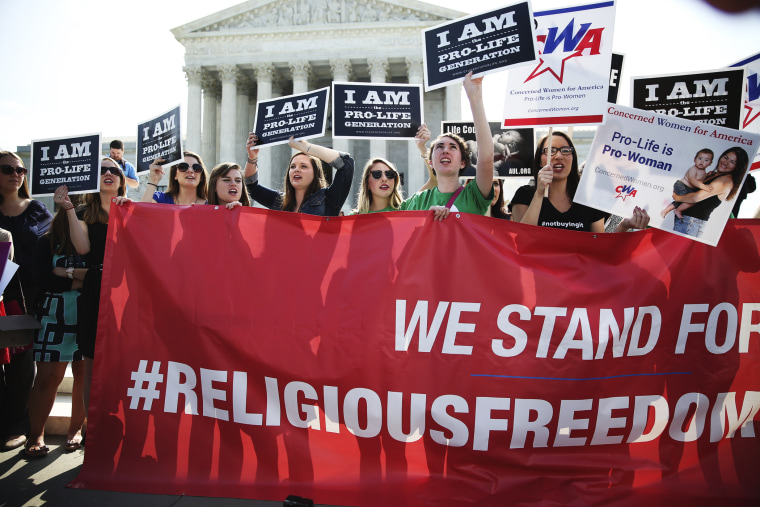The Supreme Court’s decision Monday in the high-profile Hobby Lobby case offered no shortage of familiar story lines – another divisive 5-4 ruling; another high-court loss for the Obama administration, another expansion of corporate personhood. But one key aspect of the decision is unique, and it deserves more attention than it’s gotten.
Justice Samuel Alito’s decision amounts to a shell game because the critical fact he relied on to decide the case -- that the government has an alternative way to offer contraception without making objecting employers pay for it – is no fact at all. It is, instead, a hotly-disputed issue. The government’s alternative plan has been rejected by some religious groups, and those groups and the government are duking it out in court even now over the plan’s legality.
If the religious groups win, the underpinning for Alito’s decision will have evaporated.
Constitutional adjudication on disappearing facts ... such is life in a Snapchat world.
To follow the move Alito made – and why it drew a sharp rebuke from Justice Ruth Bader Ginsburg in dissent – it’s important to understand what the court had to decide in Hobby Lobby. The big question was whether the government can make Hobby Lobby offer insurance coverage for contraception that the company objects to on religious grounds. But to resolve that issue, the court had to answer two other questions: First, does Obamacare’s contraceptive mandate “substantially burden” Hobby Lobby’s religious exercise? Second, if it does, is the mandate the “least restrictive means” of furthering a compelling government interest?
Translated into English, it wasn’t enough for Hobby Lobby’s lawyers to show that the mandate offended the company’s beliefs. They also had to show that the government could accomplish its goals without imposing the mandate on Hobby Lobby. If it couldn’t prove that – if the government had no “less restrictive means” -- then the mandate would survive, no matter how offended Hobby Lobby’s owners might be.
This issue, in short, was the case’s key fact.
And that’s exactly what made Justice Alito’s answer remarkable. Alito concluded that the government does have a less restrictive option: It can just offer Hobby Lobby the same alternative the Department of Health and Human Services (HHS) already ginned up as a compromise for religious groups. Under that alternative plan, if a religious group certifies that it’s offended by particular contraceptives, coverage for those contraceptives is excluded from the health plan the group offers to its employees. Instead, the insurance company that issues the health plan has to offer the contraceptive coverage directly to employees who want it, and has to pick up the tab.
For Justice Alito, that alternative ended the case. “HHS itself has demonstrated that it has at its disposal an approach that is less restrictive than requiring employers to fund contraceptive methods that violate their religious beliefs,” he wrote. The contraceptive mandate thus violated the “least restrictive means” test. Ballgame over.
But wait! As it turns out, the government’s alternative plan is itself being challenged by religious groups, some of whom say the plan still burdens their beliefs because it makes them set in motion the events that lead to contraceptive coverage. Those cases are still pending – including in the Supreme Court – and the government’s alternative may well be struck down. In other words, the alternative plan whose existence decided the case may not exist at all, or not for long.
That sticking point became apparent at oral argument back in March. Asked about the government’s alternative plan, Hobby Lobby’s lawyer, Supreme Court wizard Paul Clement, refused to say whether Hobby Lobby would sue over that too. “We haven’t been offered that accommodation,” he said, “so we haven’t decided what kind of objection, if any, we would make to that.”
Nor did Alito assuage any concern about the alternative plan in his opinion Monday. On the contrary, he pointedly refused to say whether it will survive. “We do not decide today,” he wrote, “whether an approach of this type complies with [federal law] for purposes of all religious claims.”
All of this led Ginsburg to ask, in so many words, What are you doing deciding the case on this ground? The majority “ultimately declines to decide whether the [alternative plan] is even lawful,” she wrote. What’s more, she added, in Hobby Lobby’s briefs the company “barely addressed” the government’s alternative plan. “Yet the Court is content to decide this case . . . on the ground that HHS could make an accommodation never suggested in the parties’ presentations.” That, she wrote, is not a “sensibl[e]” way of interpreting the law.
It is an odd feature of one of the year’s biggest cases: If the government’s alternative plan is struck down in the months to come, Hobby Lobby will be a constitutional ruling resting on thin air.
Dominic Perella is a partner in the law firm of Hogan Lovells, where he specializes in Supreme Court and appellate litigation.
